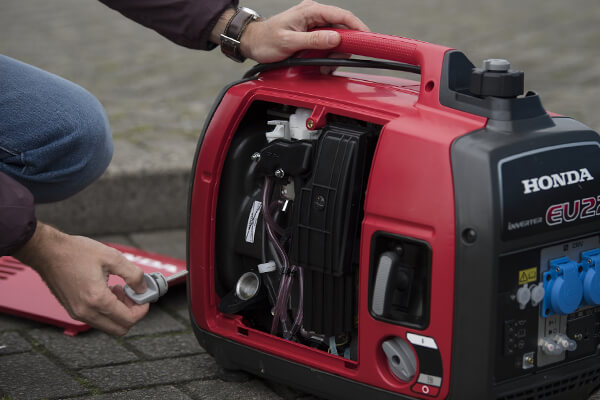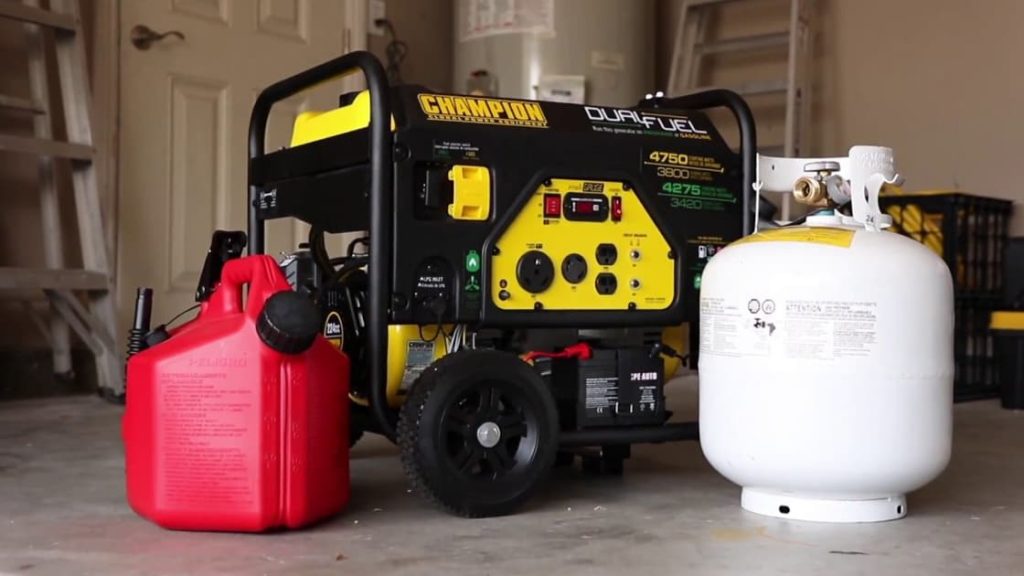Intro
What do you think about the question “How to reduce generator fuel consumption?” This is the topic you are interested in?
A generator is a machine that uses an engine and lets the engine run again thanks to fuel. So it can be said that fuel is the life and soul of the generator.
Fuel consumption is a major issue in generator’s working which directly affects its lifespan and productivity. Depending on the type of fuel, there are varying levels of consumption. Therefore saving money by knowing how much you should use in order not only help users but also ensure stable operation.
In this article, we will share simple tips and instructions to help you reduce the fuel consumption rate of your generator effectively.
Related:
- What is an inverter generator?
- How to maintain a generator
- Inverter Generator Vs Generator – Which Type Should You Buy?
How can we reduce the fuel consumption of the generator?
Generator fuel consumption is a very important factor in the total cost of electricity generation, and fuel costs make up the bulk of this cost. While it is estimated that there are many ways to reduce generator fuel consumption, some of the ways below are in our opinion important for successful results.
1. Use a suitable generator
When it comes to backup generators, you need the right equipment for your needs. This means knowing what energy requirements and power demands will be placed on a generator before purchasing one so that both overloading or underutilizing isn’t an issue in any way!
Choosing the right generator for your requirements is also a part of determining fuel economy. A generator of moderate capacity means less fuel consumption.
By using an inverter generator that is capable of automatically adjusting engine speed to match the load, you can also increase fuel efficiency since the generator will only run at a higher speed when necessary.
When there is a sudden surge in demand, it takes time for an engine to accelerate from idle speeds which results in unnecessary idling and wasted fuel.
2. Fuel-Efficient Engines
Since all engines are not designed equally efficient, understanding how efficient various models are will help you determine which one will save you more money on fuel costs over its life span.
When selecting a new engine for your generator set, consider only models that are equipped with the latest emission control technologies.
Inverter generator with Economy Mode saves fuel
3. Use of Proper Engine Speed
Using proper engine speed is also very important for saving the generator’s fuel consumption. If you are not aware of the right engine speed, then better to ask someone who has a lot of experience or read some guides online to avoid confusion or any other mistake which could lead to wasting a huge amount of money as well as fuel.
The majority of us think that a higher number for RPM for increasing productivity but it’s simply wrong because it actually affects the lifespan of your machine and saves almost no fuel.
4. Use the proper fuel and guaranteed
Using the wrong type of fuel for your generator can render it inoperable and damaged. Make sure you use the right fuel that keeps your generator running smoothly and prevents problems like the engine.
Using high-grade and guaranteed fuel to help completely burn fuel during generator operation to minimize excess, sediment. Thus they can achieve better performance and more fuel economy.
5. Check and remove carbon deposits after a period of use
Diesel generators are faced with the challenge of cleaning their engines after continuous use, and this can be a daunting task because diesel releases an ash carbon polymer that accumulates on various components. This is what causes black smoke for many people who own these machinery pieces.
A build-up of carbon deposits on certain components can cause excessive wear and tear in your diesel engine, leading to poor performance over time due to insufficient oil or dirty filters. So you need to regularly check and clean valves, injectors, fuel filters… for the generator to work well and save fuel.
Keep the air filter clean to improve airflow and reduce resistance; dirty air filters can increase fuel consumption by 10-25%.
6. Ensure coolant temperature
The same applies to the cooling system of the generator set. If this is not able to dissipate heat efficiently, then fuel will be consumed faster due to higher engine temperatures.
If you increase the temperature of your generator’s coolant by just 10 degrees Fahrenheit (or 5 degrees Celsius), this will reduce its fuel efficiency by as much as 3%.
It is recommended to maintain a stable water temperature in the generator, the cooling water temperature should be maintained at 45-65 ℃. If the water temperature is low, it will not burn all the fuel and increase the load on the machine. Attention: Generator cooling water must not use sewage, turbid water, or rainwater.
7. Efficient Load Management
It’s important to maintain consistent power generation when choosing the right size engine for your application, but it is equally important to manage your load in order to take advantage of all opportunities for fuel conservation.
Using the correct loading pattern can maximize generator efficiency and reduce total fuel consumption by approximately 5%. Of course, not every customer requires exactly the same load so this must be balanced with other factors such as economy and reliability.
Setting your generator for 50% load will not yield optimum results either because it may produce less than its full rated output due to low voltage or frequency problems. This pattern should be avoided whenever possible since heavy loads reduce maintenance intervals, prolong component life, and improve the fuel efficiency of the generator.
Another important factor to consider is how long your loads will run. In order to avoid overloading your system, it’s better if you run your equipment for a short time on low output or at a higher load for a longer period. You can then schedule maintenance work accordingly.
If you have automatic transfer switches that allow you to automatically configure power distribution based on the availability of utility power, this feature can also be used to reduce generator operating time since electricity from the grid runs through these switches when available.
8. Determine load needs and do not overload the generator
In order to reduce generator fuel consumption, it’s important to examine the load profile of your electrical system. In other words, you should know when exactly you need power and how much electricity that corresponds to.
You can then configure your generator set accordingly in order to reduce wasteful idle times. This includes allowing enough time for a start-up delay if necessary. Since many generators have automatic load shedding systems, this also reduces unnecessary spiking of voltage which can cause damage to various parts of the equipment during brownouts or outages.
It is equally important not to overload your Genset by connecting too many appliances because the higher demand will result in additional loading on the engine, shortening its useful life.
In addition, using unnecessary energy increases fuel consumption and can lead to unnecessary wear and tear on your generator.
9. Periodic Maintenance
Most engines require periodic maintenance in order to ensure maximum performance and efficiency throughout their lives. Over time, contaminants from exhaust gasses adhere to the engine’s internal surfaces which causes a deterioration in overall efficiency levels.
While this problem cannot be avoided altogether due to unavoidable factors such as particulates in the air, a properly-maintained engine will help reduce fuel costs and increase generator life. A poorly-maintained generator can use up to 30% more fuel.
These inspections can be done monthly, annually, or even more frequently depending on the load placed on the engine.

Periodic maintenance of generators
10. Use alternative power sources and reduce generator usage
We should only use generators in an emergency when there is a power outage and to supply power to essential equipment. This helps you save a lot of fuel for your generator.
You may also consider purchasing a commercially available solar-powered generator. These generators incorporate photovoltaic cells which are sunlight-driven. That is to say, they can store power in batteries and use this stored power for running appliances instead of using fuel from a gas generator.
Also, it might be possible to reduce the usage of certain appliances during periods of high demand for the generator. For example, if you have an appliance that uses a lot of electricity (such as an electric oven or tumble dryer), try switching it off when other appliances need extra power from the generator.
Conclusion
As you can see, it is fairly easy to reduce fuel consumption on your generator and save yourself a lot of money in the process.
One of the most important things in our opinion is that we need to regularly maintain our generators carefully. This helps the generator to operate at its best efficiency, save fuel and have a sustainable life.
By following these tips and suggestions, we hope that you will be able to enjoy long-term savings as well as keep your generators running at their best efficiency.
If you have any questions or concerns about this blog post, please do not hesitate to reach out. We would love to hear from you!
Thanks for reading!




